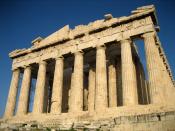Mythology is the study and interpretation of myth and the body of myths of a particular culture. Myth is a complex cultural phenomenon that can be approached from a number of viewpoints. In general, myth is a narrative that describes and portrays in symbolic language the origin of the basic elements and assumptions of a culture. Mythic narrative relates, for example, how the world began, how humans and animals were created, and how certain customs, gestures, or forms of human activities originated. Almost all cultures possess or at one time possessed and lived in terms of myths.
Myths differ from fairy tales in that they refer to a time that is different from ordinary. The time sequence of myth is extraordinary- an "other" time - the time before the conventional world came into being. Because myths refer to an extraordinary time and place and to gods and other supernatural beings and processes, they have usually been seen as aspects of religion.
Because of the inclusive nature of myth, however, it can illustrate many aspects of individual and cultural life.
Meaning and interpretation From the beginnings of Western culture, myth has presented a problem of meaning and interpretation, and a history of controversy has gathered about both the value and the status of mythology.
Myth, History, and Reason In the Greek heritage of the West, myth or mythos has always been in tension with reason or logos, which signified the sensible and analytic mode of arriving at a true account of reality. The Greek philosophers Xenophanes, Plato, and Aristotle, for example, exalted reason and made sarcastic criticisms of myth as a proper way of knowing reality.
The distinctions between reason and myth and between myth and history, although essential, were never quite absolute. Aristotle concluded that in some of the early...



NO!
Dude you copied this straight off the net.
2 out of 2 people found this comment useful.